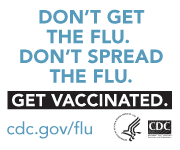
What is H1N1 Flu (formerly Swine Flu)?
H1N1 Influenza is a contagious respiratory illness caused by a new strain of influenza virus. This virus may cause more illness or more severe illness than usual.
How does the Flu spread?
Flu viruses spread mainly from person to person through coughing or sneezing. Sometimes people may catch flu by touching something infected and then touching their mouth or nose.
What are symptoms of the H1N1 Flu?
Symptoms of flu include fever (100-104 degrees Fahrenheit) or chills AND a cough or sore throat. Other symptoms include:
- Diarrhea
- Runny or stuffy nose
- Body aches
- Fatigue
- Vomiting
- Headache
If I experience flu-like illness while I am at Central Carolina Community College, what should I do?
You should leave campus and contact your health care provider. Also, it is your responsibility to contact your instructor if you will miss class.
If you are sick with flu-like illness, stay home from work or school except to get medical care. You should stay home for at least 24 hours after you no longer have a fever (without using fever-reducing medicine-any medicine that contains ibuprofen or acetaminophen). While sick, limit contact with others to keep from infecting them.
What are the Action Steps to Prevent the Spread of Flu?
#1: Talk to your health care provider to find out if you should get vaccinated.
Get the recommended seasonal flu vaccine. This is the most important step in protecting against seasonal flu. Note: A seasonal vaccine will not protect you against H1N1.
Get the recommended H1N1 vaccine when it becomes available. People at greatest risk for H1N1 infection include children, pregnant women, and people with chronic health conditions like asthma, diabetes, or heart and lung disease.
#2: Take everyday preventive actions.
Wash your hands often with soap and water, especially after you cough or sneeze. If soap and water are not available, alcohol-based hand cleaners are also effective.
Cover your nose and mouth with a tissue when you cough or sneeze. Throw the tissue in the trash after you use it.
If you do not have a tissue, cough or sneeze into your upper sleeve, not your hands.
Avoid touching your eyes, nose, or mouth, since germs are commonly spread this way.
Use antiseptic wipes to clean high-touch surfaces, such as door knobs, desk surfaces, telephones, etc.
Try to avoid close contact with sick people. If you do provide care for a sick family member, wear a mask or have them wear a mask, when providing care.
Are there medicines to treat H1N1 infection?
Yes, antiviral medicines can fight the flu by keeping flu viruses from reproducing in your body. They can be prescribed by a health care provider as pills, liquids, or as an inhaler. Antiviral drugs work best if started within the first two days of symptoms.
For more information, visit flu.gov or call (800) CDC-INFO (232-4636).





